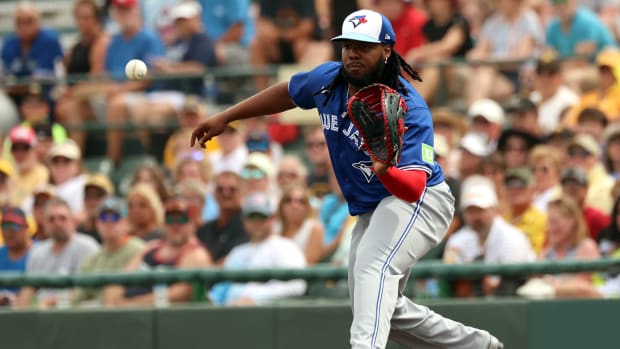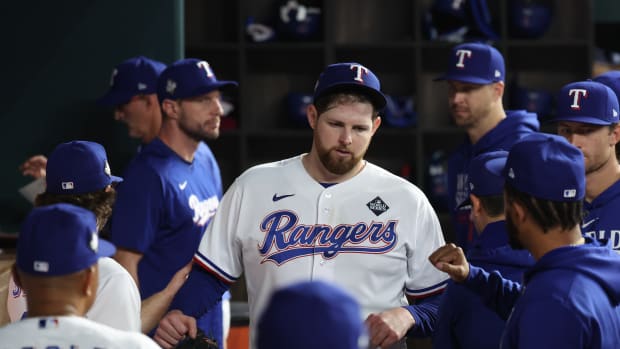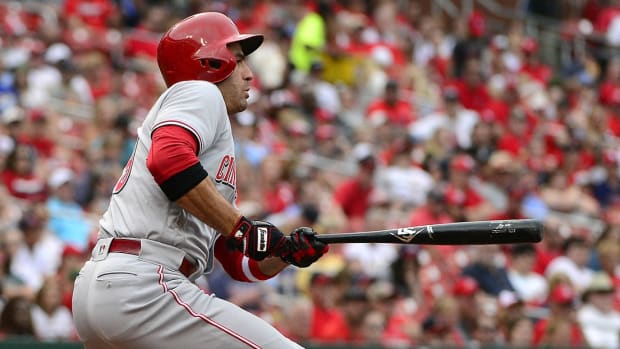How Blue Jays' Saucedo Turned His Darkest Moments Into a New Outlook on Life
Tayler Saucedo’s trips to Kent, Wa., were a regular occurrence.
After the COVID-19 pandemic wiped out the minor-league baseball season in 2020, Saucedo made a routine of driving 30 minutes south from his home in Seattle to train at Big League Edge baseball facility.
During each mundane drive, though, something was building within him. Alone with his thoughts, the noise in his head pounded him lower and lower. For a stretch of time, the feeling became too much.
“It got to the point where I would try to drive to the field to go throw somewhere and I’d be like, ‘Today's the day that I'm going to end my life,’” Saucedo said.
Saucedo’s emotions were like a train flying off the track. The structure of his life had been upended—for the first time since he was four years old, baseball wasn’t a part of his life, and he didn’t know how to respond.
Without baseball as a tether, Saucedo felt trapped. And then he fell apart.
“I just really started to crumble inside,” the Blue Jays reliever said. “And it was very confusing to feel that way. Every day was the same, and I didn't feel like I was gonna get out of it.”
His mind—which was previously full of encouragement—betrayed him, tossing him into a downward spiral. It was within that storm, however, that Saucedo confronted his emotions, acknowledged something was wrong, and promised himself he’d climb out of it.

A 21st round draft pick by the Jays in 2015, Saucedo turned in a respectable rookie season in 2021, posting a 4.56 ERA (97 ERA+) and limiting left-handed hitters to a .139 batting average.
© Timothy T. Ludwig-USA TODAY Sports
The path to healing took some time. Saucedo wasn't ashamed to say he spent lots of his days alone, crying, and wrestling with anxieties. Eventually, he sought professional guidance.
Saucedo started with talk therapy but eventually found journaling to be the most effective method. And that’s how he turned the corner, by regularly jotting down a few lines about why he was feeling a certain way and being brutally honest about it.
“Once I put it down on paper, I was like, ‘Okay, this is something you can get out of,’” he said. “It's just you; it's your own voice; you're controlling this.”
When baseball returned for the 2021 season, Saucedo was in control, mentally and physically. The left-hander was excellent early in the Triple A season, pitching 16.1 innings with a 2.20 ERA and 21 strikeouts for the Bisons.
With Toronto’s bullpen in shambles, Saucedo got the call to the Blue Jays on June 12 and made his MLB debut against the Yankees on June 17, a day before his 28th birthday.
After a clean inning of work, Saucedo jogged to the Blue Jays dugout and took a moment to soak it all in.
“I remember just sitting there, [thinking] ‘What a journey. What a moment.’ It was great,” he said.
Saucedo didn’t post eye-popping stats the rest of the way, but he was effective when called upon. His 4.56 ERA and 6.7 K/9 in 29 games weren’t particularly sexy numbers, but the 6-foot-5 reliever was devastating against left-handed hitters, limiting them to a .139 batting average and a .411 OPS.
Saucedo was optioned back to Buffalo three times in 2021, as the Blue Jays finished with 91 wins, one short of a playoff spot. Toronto’s season was over in October, and two months later Saucedo got a call from his mom, Tanya, and his step-dad, Steve Honn, to come visit their house in Tuscon, Az.

Saucedo's framed jersey sits in his family's home office in Tuscon, Az., as a testament to his perseverance.
When Saucedo stepped into Steve’s home office, he teared up. Framed on the wall was Tayler’s baby blue No. 54 Blue Jays jersey, alongside the lineup cards from both his A-ball debut in 2016 and his first game on a major-league roster in 2021.
“It was literally just like butterflies, knots in my stomach,” Saucedo said of his parents' surprise for him. “To know how close I was to giving up on everything, and then to see that … I’m getting goosebumps now. It’s unbelievable.”
Tanya said she and Tayler have a special word they use with one another: perseverance. They’ve always been very close, and the framed setup was a testament to Tayler’s determination through all his challenges. It was also symbolic of how much Tanya and Steve loved their son.
“We wanted to surprise him to let him know that, yes, you never gave up,” Tanya said. “You fulfilled your dream.
“We've done it as a family in the sense of support, but it's all been on Tayler. Tayler's the one that never gave up; Tayler's the one that continued to persevere through it all, through the mental health challenges, through the grind of being competitive, being told that he probably wouldn't make it. It was just a little special moment for all of us.”

From left to right: Tayler, Tanya, and step-dad Steve Honn, who's been in Tayler's life since he was seven years old.
Now, Saucedo said he’s doing much better, thanks in large part to the Blue Jays mental performance staff, with whom he communicates when needed. And if those emotions re-escalate, Saucedo has strategies in place.
“I just sit there and I talk to myself. You might think I'm a crazy person,” Saucedo said with a laugh. “You see me walking down the side of the street, I'm just talking to myself, but it's just me analyzing and processing all of my emotions.”
Saucedo said he doesn’t think mental health is talked about enough in pro sports, though he acknowledged progress is being made—he mentioned NFL receiver Calvin Ridley and female tennis star Naomi Osaka as two athletes he respected for sharing their stories.
It’s because of this stigma around mental health—particularly men’s mental health—that Saucedo envisions a unique role for himself on this Blue Jays team.
“[I want] to be a resource for people to use if they're going through stuff like that,” Saucedo said. “I've talked to a few guys about anxiety and stuff.”
On the field, Saucedo has free-flowing ambitions.
“Just have a successful career, however that is,” he said of his goals. “If that's a guy that's up and down, trying to earn a spot and being a good teammate and being ready whenever they need me, that's all I want to do.
"I just want to enjoy it because it goes by really fast. I'm already in year eight now, so I just want to enjoy it and get as much out of it as I can.”
Given all he’s been through, it'd be fair to categorize Saucedo's career as a success. So, after everything, is the battle finally over?
“Not yet,” he said with a smile.
There’s still work to be done. And, for now, Saucedo’s journey continues.





